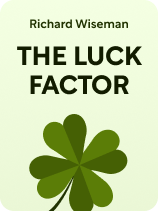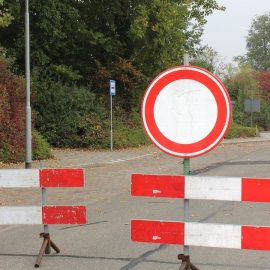

This article is an excerpt from the Shortform book guide to "The Luck Factor" by Richard Wiseman. Shortform has the world's best summaries and analyses of books you should be reading.
Like this article? Sign up for a free trial here.
Does luck exist? If so, what causes luck? Can luck be explained scientifically?
Richard Wiseman, psychologist and the author of The Luck Factor, performed studies to see if there is any scientific proof that luck exists. He also discusses a few scientific discoveries that were made thanks to “luck.”
Continue reading to learn Wiseman’s take on the existence of luck.
In Search of Luck
Does luck exist? The first step in performing a scientific study is to define the question being asked. In his research, Wiseman’s underlying question was “Is luck purely random, and if not, what causes it?” Wiseman details the myriad ways luck shows up in our individual lives and in the wider world, as well as why he considers it a subject worthy of study.
Many of us credit luck—good or bad—for the random occurrences that shape our lives. An accidental swerve of your steering wheel can mean the difference between being in a tragic accident or, by chance, avoiding one. A spur-of-the-moment decision as to where you eat dinner could lead to an encounter with your future spouse, whose path you might otherwise never have crossed. A random selection of lottery numbers can mean the difference between unexpected wealth and another night of poring over gloomy finances. Wiseman asks whether these events are truly random or if some people live blessed—or cursed—lives.
(Shortform note: Wiseman describes luck as a universal factor that people either believe in or don’t, but further research has shown that people attribute different types of circumstances to different kinds of luck in their lives. For instance, people who blame bad luck for their problems are more likely to view luck as an external force, whereas those who feel they experience good luck tend to think of luck as something inside themselves. In other words, people with bad luck externalize its source, whereas people with good luck tend to say, “I am lucky.” The latter group tends to be happier overall, displaying traits that this guide will show how to cultivate.)
Wiseman cites numerous examples where lucky circumstances have affected the realms of technology and business. Many scientific breakthroughs have been made by seemingly random chance, such as when astronomer William Herschel chanced upon the planet Uranus while surveying a small patch of the sky with his telescope. Through luck, entrepreneurs have stumbled on new inventions when chance revealed unintended applications for products other than what their designers intended—such as when Spencer Silver accidentally invented the “sticky note” when he failed to produce a high-powered adhesive, resulting in a much weaker one instead.
| Practical Luck To be fair, neither Herschel nor Silver happened across their lucky discoveries completely by accident—they were actively looking for something other than what they found. For instance, Herschel was looking for undiscovered comets, which—like distant planets—appear as tiny specks of light moving against the background of stars. Likewise, Spencer was trying to develop an adhesive strong enough to be used in building airplanes, and the glue that makes sticky notes work resulted from a failed attempt whose modern application wasn’t realized until over a decade later. In both cases, “luck” wasn’t purely random—it was the result of hard work that created an opportunity for discovery, as we’ll show later in this guide. You can’t count on duplicating such discoveries; however, stories like these and others Wiseman offers are so prevalent in business literature that they obscure the many failures that come before every success. For this reason, business consultant Clayton Christensen argues in favor of doing everything you can to eliminate randomness from entrepreneurship. In Competing Against Luck, Christensen presents a theoretical framework for identifying customers’ true needs and how to meet them, so that “lucky breaks” like Silver’s don’t have to be lucky at all. While Christensen’s method isn’t applicable to pure scientific research such as Herschel’s, he argues that it can help minimize random chance in business ventures. |
At first glance, it appears that many things we take for granted came about because of luck—or did they? Wiseman points out that despite the impact of random chance on our lives, little scientific research has been conducted on the subject of luck, since it’s hard to measure and quantify chance events. However, Wiseman didn’t see this as a barrier, but a challenge. His early research revealed that nearly two-thirds of his test participants identified as having consistent good or bad luck, contradicting the notion that luck is purely random and hinting that other factors might be at play. Wiseman proposes that understanding those factors could lead to ways of improving your luck, assuming those factors are under your control.
(Shortform note: While research into luck is rare, experts have investigated why and how people misinterpret random chance. In Fooled by Randomness, Nassim Nicholas Taleb details the error-prone ways that we try to use chance happenings in the past to predict our future luck. Much of this is due to our limited powers of observation. We tend to falsely believe that when something happened in the past, we understand the events that led up to it and can use those to predict the future. However, when looking at what did happen, we ignore the possibilities that might have happened. Our minds have tunnel vision—we see how events brought us good luck while ignoring the bad luck that could have just as easily resulted.)

———End of Preview———
Like what you just read? Read the rest of the world's best book summary and analysis of Richard Wiseman's "The Luck Factor" at Shortform.
Here's what you'll find in our full The Luck Factor summary:
- The unconscious methods lucky people use
- The benefits of trusting your intuitive hunches
- The scientific explanation as to whether or not luck is real






